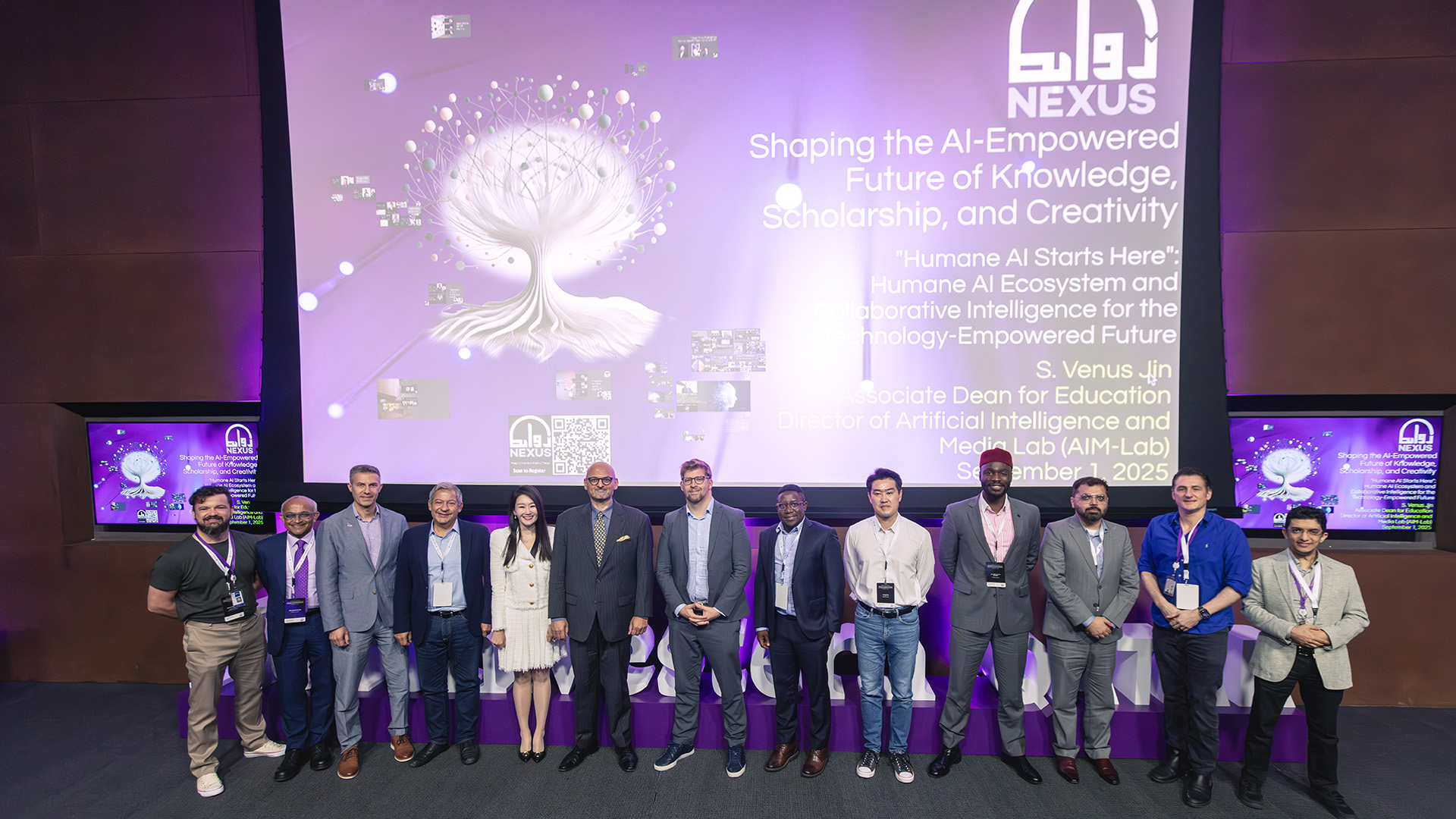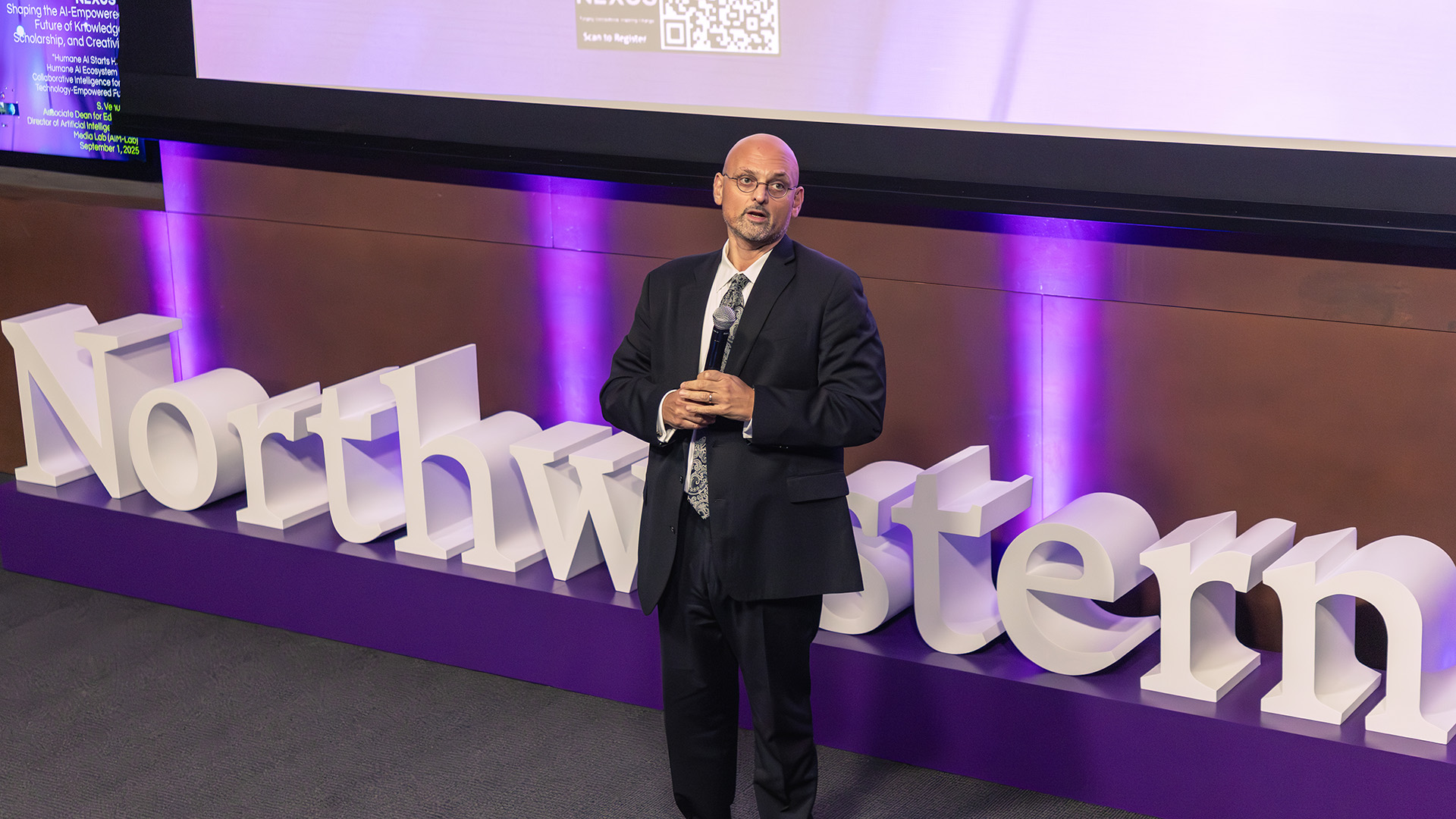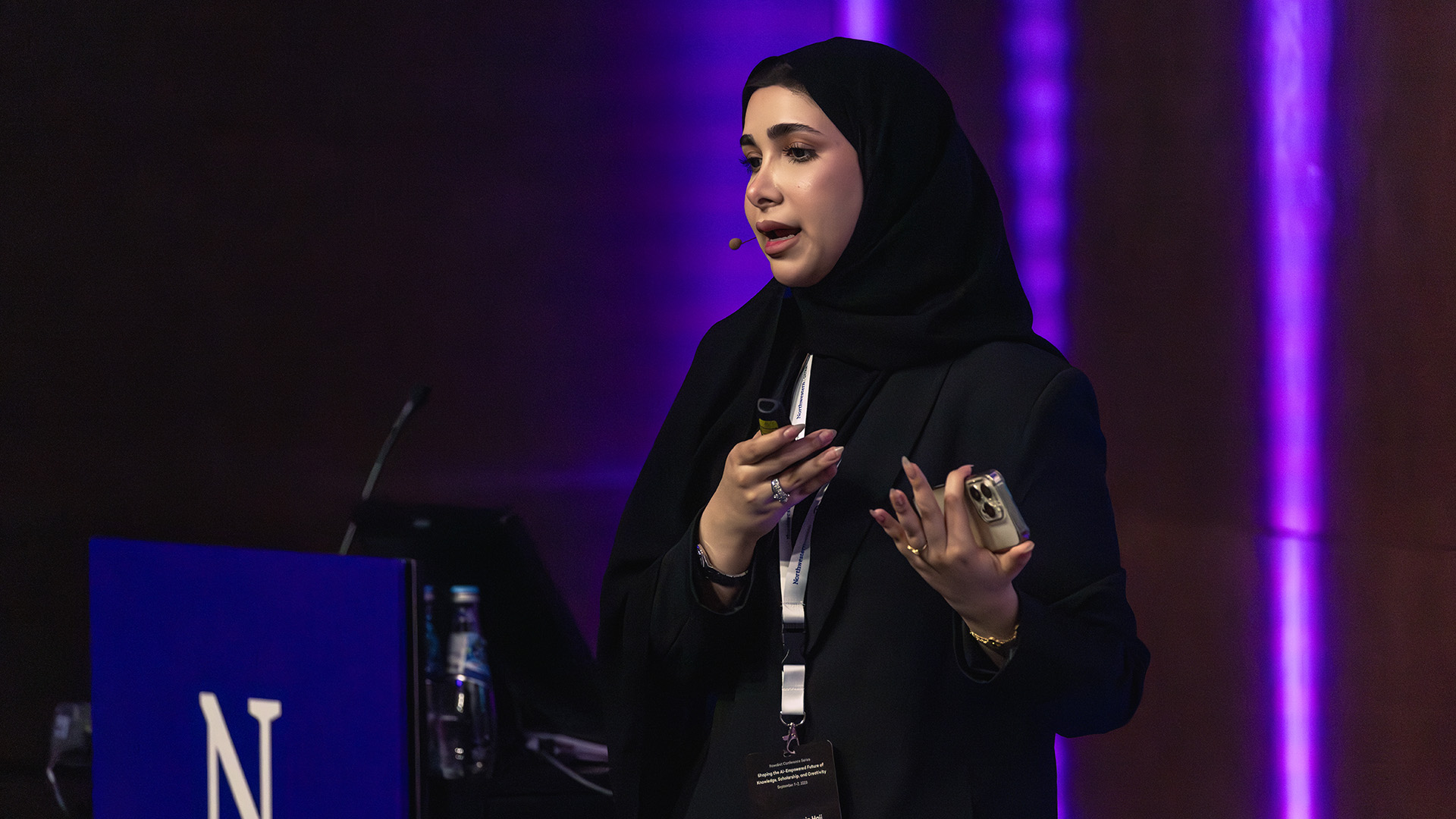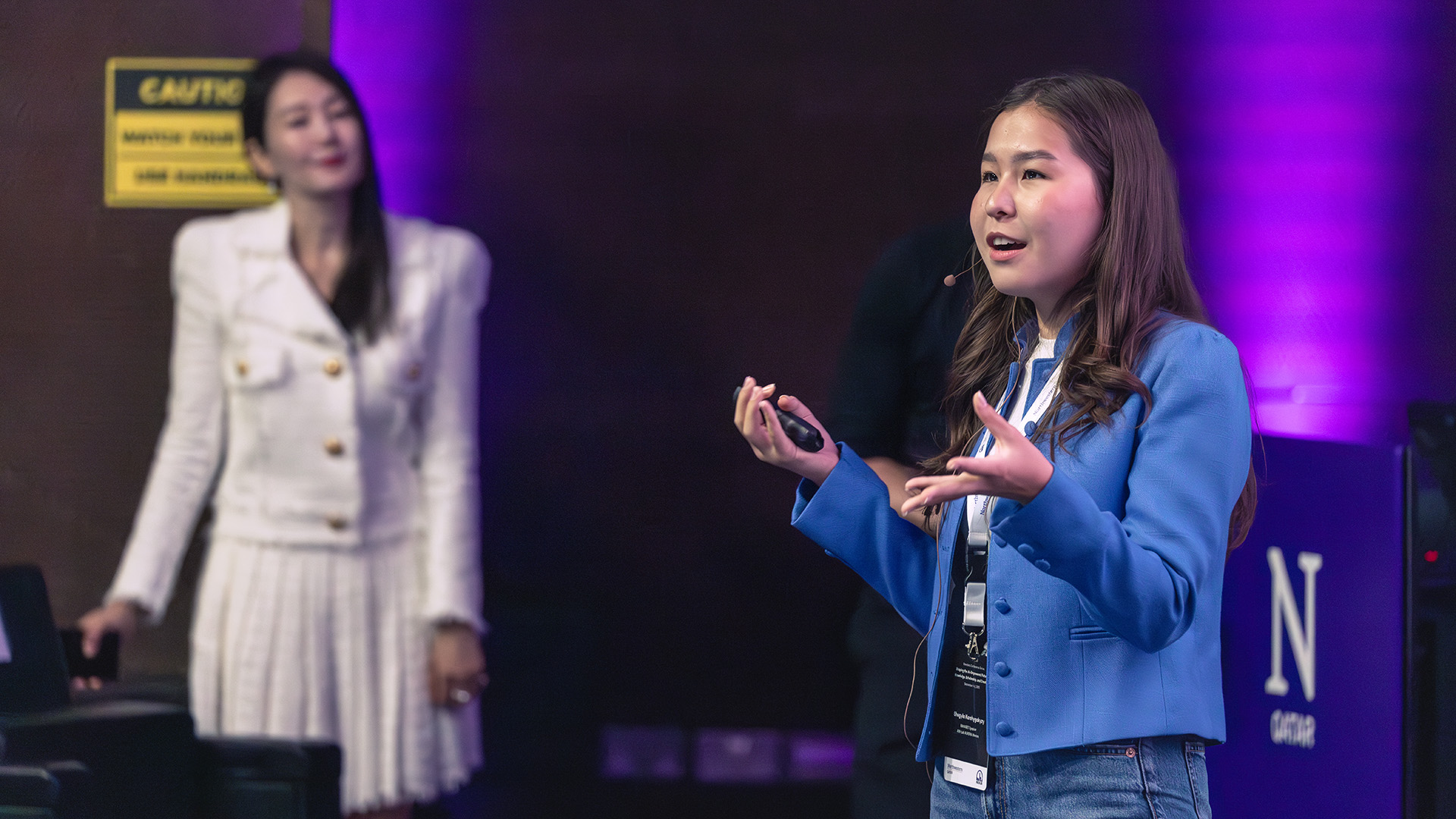Northwestern University in Qatar wrapped up its latest edition of its signature Rawabet Conference Series, titled “Shaping the AI-Empowered Future of Knowledge, Scholarship, and Creativity.” Held on September 1–2, the two-day conference brought together leading voices from academia, industry, and the arts to examine how artificial intelligence is shaping the future of knowledge, scholarship, and creativity.
In his opening remarks, Marwan M. Kraidy, dean and CEO of Northwestern Qatar, described the current moment as “the torrential phase—all AI everywhere, all the time, all at once.” Reflecting on the global implications of artificial intelligence, he noted: “Through it all, I offer a few basic observations: Nothing is inevitable… and we must keep humans in charge.”
He went on to underscore the significance of the Rawabet Conference, saying: “Rawabet conferences reflect the highest standard of multidisciplinary inquiry and scholarly rigor… Our very university is a nexus, a bridge between regional and global communities, and with this conference, we hope to continue creating sustainable, meaningful, impactful spaces for critical dialogue.”
In her opening presentation titled “Humane AI Starts Here”, S. Venus Jin, Associate Dean for Education, Founding Director of the Artificial Intelligence and Media Lab (AIM Lab), and the organizer of the conference, provided positioning remarks on building a humane AI ecosystem and collaborative intelligence. She synthesized the six focal themes of the conference: “The AI-Empowered Future,” “AI for a Better World,” “AI and Creativity,” “AI and Journalism,” “AI Ethics,” and “AI and the Global South”.
With 23 presentations, a special exhibition, and an interactive student-led poster, the conference explored AI’s promises and perils through the six major themes.
“Rawabet conferences reflect the highest standard of multidisciplinary inquiry and scholarly rigor… Our very university is a nexus, a bridge between regional and global communities, and with this conference, we hope to continue creating sustainable, meaningful, impactful spaces for critical dialogue”
Sessions under the first theme, “Shaping the AI-Empowered Future,” explored how AI is reconfiguring scholarly knowledge and scientific discovery. Noshir Contractor, a renowned behavioral scientist from Northwestern University, examined how AI is shaping the future of research and academic work. He was followed by V.S. Subrahmanian, co-director of the Northwestern Network for Collaborative Intelligence (NNCI), who presented on the impact of AI on fields ranging from protein synthesis and materials science to national security, and the ethical risks that come with such capabilities.
As the conversation shifted to the second theme, “AI for a Better World?”, speakers examined how AI technologies intersect with disinformation, online trust, and mental health. Marc Owen Jones, Associate Professor at Northwestern Qatar, unpacked how generative AI is fueling sophisticated “slopaganda” campaigns that flood digital spaces with low-quality, misleading content. Continuing the dialogue on responsible AI, Wajdi Zaghouani, Associate Professor at Northwestern Qatar, presented a framework for designing ethical and culturally sensitive AI systems from the ground up, emphasizing the importance of human intervention in data science. Meanwhile, Zaid Almahmoud, a postdoctoral scholar at the AIM Lab, introduced an AI-driven forecasting model that can predict mental health trends using diverse data sources.
Student scholarship also significantly contributed to the conversation, with researchers Farhan Saleh Rafid and Hannah Ahmad SA Al Mannai presenting “TreatMind,” a groundbreaking dataset mapping evidence-based treatments for mental health disorders, developed to support future AI-driven public health strategies.
Sessions under the third theme, “AI and Creativity,” explored how AI is transforming media entrepreneurship, storytelling, and artistic practice. Young Cha, CEO and Co-Founder of ODK Media, examined how the Korean entertainment industry is utilizing AI for localization, content creation, and global distribution. Another entrepreneur, Shahzad Ahmed, Co-Founder of Hoja AI, emphasized the importance of human-centered educational AI design for younger generations.
Northwestern Qatar faculty further expanded the conversation with a focus on creativity and pedagogy, with Professor Spencer Striker, who presented an AI-animated docudrama on the Islamic Golden Age; Associate Professor Sam Meekings, who introduced an adaptable and reflective classroom framework for proactively integrating Gen-AI into student writing; and Jesse Payne, Associate Professor at VCUarts Qatar, who proposed hybrid workflows that reimagine creativity at the intersection of arts and AI by blending traditional art with generative tools in art education.
Expanding on this theme, AIM Lab AURORA grantee Shugyla Karshygakyzy presented her case study on entrepreneurs’ use of generative AI for viral content creation. At the same time, student speaker and Qatari filmmaker Houra Hussain Haji reflected on the role of AI in film production and its impact on artistic authorship and whether AI enhances or erases human creativity.
The second day opened with the theme “AI and Journalism,” featuring Jeremy Gilbert, Knight Professor in Digital Media Strategy at Medill School of Journalism, who explained how AI-powered “liquid content” can personalize storytelling for various audiences.
Following this, Ilhem Allagui, Professor and Director of the Journalism and Strategic Communication Program, discussed how storytellers and marketers are using AI to accelerate production and shape strategic narratives. Meanwhile, Associate Professor Claudia Kozman shared insights from her research on audience perceptions of AI-generated sports journalism, exploring whether readers trust AI-authored content as much as that written by humans.
Sessions under the “AI Ethics” theme explored ethical and philosophical challenges that come with the rise of AI. K.V. Kiran Bhatia, digital anthropologist and Responsible AI lead at Utrecht University, presented on generative AI and gender, exploring issues of collective consent, narrative control, and women’s engagement in the Global South. Gregory Gondwe from Cal State San Bernardino and Harvard’s Berkman Klein Center tackled the pressing issue of AI bias and digital inequalities in Sub-Saharan Africa. Meanwhile, David Leslie from The Alan Turing Institute called for a move away from AI hype, urging scholars and policymakers to prioritize democratic oversight and human dignity.
Student scholarship further expanded the conversation, with Fatima Al Naemi and Tayama Rai introducing the concept of “triple jeopardy” to explain how non-Western women are rendered invisible by gendered and racialized AI systems. Similarly, Sabeeka Al-Kuwari tackled the challenges of fake news detection in Arabic and the need for dialect-aware datasets and culturally grounded moderation policies.
Final thematic sessions, “AI and the Global South,” addressed questions of equity and epistemic justice. Student researcher Ayushi Jha, mentored by Assistant Professor Rajiv Mishra, examined how digital platforms extract labor and data from users in the Global South and the ways algorithmic systems reinforce global power asymmetries. In the closing presentation, Jake Okechukwu Effoduh, Assistant Professor at the Lincoln Alexander School of Law and human rights lawyer, called for culturally adaptive definitions of AI explainability, rooted in the lived realities of African societies.
Outside the panels, conference attendees engaged with a special exhibition, “AI and (In)Justice: Unveiling the Tormentors with AI,” by Assistant Professor Shakeeb Asrar, which used generative tools to depict the often-erased faces of perpetrators of torture in media coverage. Meanwhile, an interactive poster presentation by student researchers Maureen Wu, Lama Turki Al Khater, and Maryam Rubaih Al Kubaisi, mentored by Professor Mohammed Ibahrine, explored how an AI-driven strategic campaign could localize Microsoft Cloud for audiences in Qatar.
“The pace at which AI is transforming knowledge production, scholarship, creativity, and learning is truly remarkable. What this conference afforded us is the chance to decelerate the often frenetic discourse surrounding AI and engage in more deliberate, critical reflection”
Reflecting on the conference’s impact, Jin said: “The pace at which AI is transforming knowledge production, scholarship, creativity, and learning is truly remarkable. What this conference afforded us is the chance to decelerate the often frenetic discourse surrounding AI and engage in more deliberate, critical reflection.” She added, “Central to these discussions was considering how AI can be thoughtfully designed and ethically deployed to serve a multiplicity of communities. This requires a sustained, interdisciplinary dialogue from multiple angles that bridges technological innovation with social responsibility, and I believe that this conference contributed to that.”
The Rawabet Conference Series continues to serve as a global platform for examining discussions on significant issues impacting the region and forging connections between timeless issues and timely topics. Past conferences tackled topics ranging from journalism and digital culture in the Global South to critical examinations of race and solidarity.
For more information about the Rawabet Conference Series, visit: https://www.qatar.northwestern.edu/special-events/rawabet/




